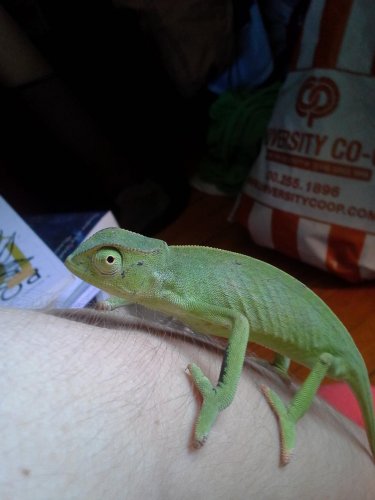samcham
New Member
Hey all! I'm a very new chameleon owner, so I may be overreacting a bit, but I thought I'd come ask you all what your thoughts were. (I also just made a vet appointment, but it isn't until tomorrow morning.)
I just got a Senegal cham from a breeder online, I've had him for about 5 days now. I'm not sure how old he is (he's roughly 5" long to the end of his tail), but he's supposedly a male. He seems generally pretty happy, often a nice leaf green color with some interspersed blue, occasionally a darker olive color. He drinks from the dripper I set up a couple times a day, and loves to bask under his UVB bulb (5.0 compact) or his basking bulb (60 W). He's in a glass cage with a screen top (18x18x24"), which I mist roughly 3-4 times a day to keep the humidity around 60-75%. I have an analog thermometer in the middle of his cage that reads around 70F. His cage has substrate on the bottom because there's a bunch of live plants in it.
Since I've gotten him I've only seen him eat 1 house fly, even though I've offered him crickets (big and small), mealworms (from a can), and live superworms. His feces the first day I had him was normal, but yesterday it was runny (but still with a white urate). He occasionally "naps" during the day in his basking spots. Yesterday and today he's been scratching at his cage doors like he wants to get out, and when I open the doors he scales my arm (but is a nice content green once on my arm). Today he also was digging in the substrate at the bottom of his cage in the corner, and starting turning stress colors until my boyfriend came and let him scale up his arm. I thought he might be hot in the cage, so we moved his lights up above the cage a little higher. But he also hangs upside down on the screen top.
Any ideas on what might be up? Like I said, I'm planning on heading to a vet tomorrow, but I was wondering if I could do anything until then to help my little guy. =(
Thank you!!

I just got a Senegal cham from a breeder online, I've had him for about 5 days now. I'm not sure how old he is (he's roughly 5" long to the end of his tail), but he's supposedly a male. He seems generally pretty happy, often a nice leaf green color with some interspersed blue, occasionally a darker olive color. He drinks from the dripper I set up a couple times a day, and loves to bask under his UVB bulb (5.0 compact) or his basking bulb (60 W). He's in a glass cage with a screen top (18x18x24"), which I mist roughly 3-4 times a day to keep the humidity around 60-75%. I have an analog thermometer in the middle of his cage that reads around 70F. His cage has substrate on the bottom because there's a bunch of live plants in it.
Since I've gotten him I've only seen him eat 1 house fly, even though I've offered him crickets (big and small), mealworms (from a can), and live superworms. His feces the first day I had him was normal, but yesterday it was runny (but still with a white urate). He occasionally "naps" during the day in his basking spots. Yesterday and today he's been scratching at his cage doors like he wants to get out, and when I open the doors he scales my arm (but is a nice content green once on my arm). Today he also was digging in the substrate at the bottom of his cage in the corner, and starting turning stress colors until my boyfriend came and let him scale up his arm. I thought he might be hot in the cage, so we moved his lights up above the cage a little higher. But he also hangs upside down on the screen top.
Any ideas on what might be up? Like I said, I'm planning on heading to a vet tomorrow, but I was wondering if I could do anything until then to help my little guy. =(
Thank you!!





